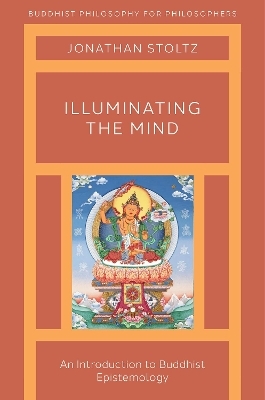
Illuminating the Mind
Oxford University Press Inc (Verlag)
978-0-19-090754-9 (ISBN)
Illuminating the Mind puts the field of Buddhist epistemology in conversation with contemporary debates in philosophy. Jonathan Stoltz provides readers with an introduction to epistemology within the Buddhist intellectual tradition in a manner that is accessible to those whose primary background is in the “Western” tradition of philosophy. The book examines many of the most important topics in the field of epistemology, topics that are central both to contemporary discussions of epistemology and to the classical Buddhist tradition of epistemology in India and Tibet. Among the topics discussed are Buddhist accounts of the nature of knowledge episodes, the defining conditions of perceptual knowledge and of inferential knowledge, the status of testimonial knowledge, and skeptical criticisms of the entire project of epistemology.
Stoltz demonstrates how many of the arguments and debates occurring within classical Buddhist epistemological treatises coincide with the arguments and disagreements found in contemporary epistemology. He shows, for example, how Buddhist epistemologists developed an anti-luck epistemology-one that is linked to a sensitivity requirement for knowledge. Likewise, Stoltz explores the question of how the study of Buddhist epistemology can be of relevance to contemporary debates about the value of contributions from experimental epistemologists, and to broader debates concerning the use of philosophical intuitions about knowledge. Illuminating the Mind is essential reading for scholars and students interested in epistemology and its treatment in intellectual traditions beyond Western philosophy.
Jonathan Stoltz is a professor of philosophy at the University of St. Thomas (Minnesota) where he has been teaching since 2006. His scholarly research is focused on the areas of epistemology and the philosophy of logic, both in the 'Western' tradition and in the Indian and Tibetan traditions of philosophy.
Preface
Chapter 1: Preliminaries
1. Two Histories
2. Core Terms and Concepts
3. Pramana
4. The Episodic Nature of Cognition/Knowledge
5. Main Themes of the Book
Chapter 2: Knowledge
1. Defining Knowledge?
2. Revealing the Unknown
3. Non-deceptive Cognition
4. Analytic Theories of Knowledge and 'The Standard Analysis'
5. Pramana and Reliabilism
Chapter 3: Perception
1. Perception and Non-conceptual Awareness
2. Perceptual Judgment
3. Four Types of Perception
4. Reflexive Perception and Self-awareness
5. Perception, Illusion, and Hallucination
Chapter 4: Inference
1. Two Forms of Inference
2. Inference and Conceptual Cognition
3. The Structure of Inferential Reasoning
4. Evidence and Entailment
5. Epistemic Closure
Chapter 5: Testimony
1. The Nyaya Account and the Buddhist Response
2. Reductive and Non-reductive Theories of Testimonial Knowledge
3. Speakers, Hearers, and Knowledge
4. The Transmission Theory of Testimony
Chapter 6: Ignorance
1. Mistaken Cognition
2. Ignorant Perception
3. Ignorant Veridical Conception
Chapter 7: Skepticism
1. Skepticism and Skeptical Scenarios
2. Knowledge and Instruments of Knowledge
3. Nagarjuna and the Epistemic Regress Problem
4. The Structure of Knowledge
Chapter 8: Sensitivity & Safety
1. Knowledge, Perception, and Inference
2. Tracking and Sensitivity
3. Safety and Knowledge
4. Discrimination and Alternatives
Chapter 9: Internalism & Externalism
1. The Etiology of Cognition
2. Analyzing Knowledge and Internalism
3. Intrinsic vs. Extrinsic Determination of Knowledge Status
4. Factive Mental Episodes and Externalism
Chapter 10: Experimental & Cross-cultural Epistemology
1. Philosophical Intuitions and Experimental Epistemology
2. Cross-cultural Intuitions about Knowledge
3. The Value of Buddhist Epistemology
Notes
Bibliography
Index
| Erscheinungsdatum | 08.04.2021 |
|---|---|
| Reihe/Serie | Buddhist Philosophy For Philosophers |
| Verlagsort | New York |
| Sprache | englisch |
| Maße | 157 x 236 mm |
| Gewicht | 612 g |
| Themenwelt | Geisteswissenschaften ► Philosophie ► Erkenntnistheorie / Wissenschaftstheorie |
| Geisteswissenschaften ► Philosophie ► Östliche Philosophie | |
| ISBN-10 | 0-19-090754-1 / 0190907541 |
| ISBN-13 | 978-0-19-090754-9 / 9780190907549 |
| Zustand | Neuware |
| Informationen gemäß Produktsicherheitsverordnung (GPSR) | |
| Haben Sie eine Frage zum Produkt? |
aus dem Bereich

![Was heißt Denken?. Vorlesung Wintersemester 1951/52. [Was bedeutet das alles?] - Martin Heidegger](/media/113619842)
